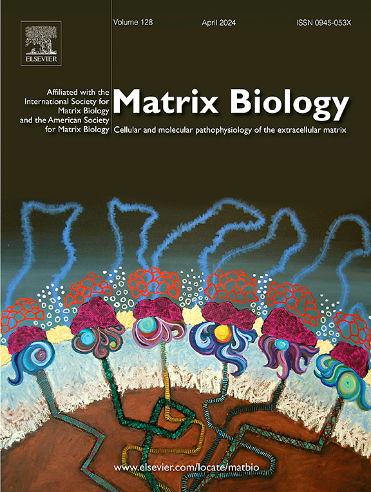A CNA-35-based high-throughput fibrosis assay reveals ORAI1 as a regulator of collagen release from pancreatic stellate cells
IF 4.5
1区 生物学
Q1 BIOCHEMISTRY & MOLECULAR BIOLOGY
引用次数: 0
Abstract
Rationale
Pancreatic stellate cells (PSCs) produce a collagen-rich connective tissue in chronic pancreatitis and pancreatic ductal adenocarcinoma (PDAC). Ca2+-permeable ion channels such as ORAI1 are known to affect PSC proliferation and myofibroblastic phenotype. However, it is unknown whether these channels play a role in collagen secretion.
Methods
Using the PSC cell line PS-1, we characterized their cell-derived matrices using staining, mass spectroscopy, and cell migration assays. We developed and validated a high-throughput in vitro fibrosis assay to rapidly determine collagen quantity either with Sirius Red or, in the optimized version, with the collagen-binding peptide CNA-35-tdTomato. We assessed collagen deposition upon stimulating cells with transforming growth factor β1 (TGF-β1) and/or vitamin C without or with ORAI1 modulation. Orai1 expression was assessed by immunohistochemistry in the fibrotic tumor tissue of a murine PDAC model (KPfC).
Results
We found that TGF-β1 and vitamin C promote collagen deposition from PSCs. We used small interfering RNA (siRNA) and the inhibitor Synta-66 to demonstrate that ORAI1 regulates collagen secretion of PSCs but not NIH-3T3 fibroblasts. Physiological levels of vitamin C induce a drastic increase of the intracellular [Ca2+] in PSCs, with Synta-66 inhibiting Ca2+ influx. Lastly, we revealed Orai1 expression in cancer-associated fibroblasts (CAFs) in murine PDAC (KPfC) samples.
Conclusion
In conclusion, our study introduces a robust in vitro assay for fibrosis and identifies ORAI1 as being engaged in PSC-driven fibrosis.

一项基于na -35的高通量纤维化试验显示ORAI1是胰腺星状细胞胶原释放的调节因子。
原理:胰腺星状细胞(PSCs)在慢性胰腺炎和胰腺导管腺癌(PDAC)中产生富含胶原的结缔组织。Ca2+渗透性离子通道如ORAI1已知影响PSC增殖和肌成纤维细胞表型。然而,这些通道是否在胶原蛋白分泌中起作用尚不清楚。方法:使用PSC细胞系PS-1,我们通过染色、质谱和细胞迁移测定来表征其细胞来源的基质。我们开发并验证了一种高通量的体外纤维化检测方法,可以快速测定胶原蛋白的数量,无论是用Sirius Red还是在优化版本中,用胶原蛋白结合肽na -35- tdtomato。我们评估了转化生长因子β1 (TGF-β1)和/或维生素C刺激细胞时的胶原沉积,没有或有ORAI1调节。采用免疫组化方法检测Orai1在小鼠PDAC模型(KPfC)纤维化肿瘤组织中的表达。结果:我们发现TGF-β1和维生素C促进PSCs胶原沉积。我们使用小干扰RNA (siRNA)和抑制剂Synta-66证明ORAI1调节PSCs的胶原分泌,但不调节NIH-3T3成纤维细胞。生理水平的维生素C诱导PSCs细胞内[Ca2+]的急剧增加,Synta-66抑制Ca2+内流。最后,我们在小鼠PDAC (KPfC)样本中发现了Orai1在癌症相关成纤维细胞(CAFs)中的表达。结论:总之,我们的研究引入了一种强大的纤维化体外检测方法,并确定ORAI1参与psc驱动的纤维化。
本文章由计算机程序翻译,如有差异,请以英文原文为准。
求助全文
约1分钟内获得全文
求助全文
来源期刊

Matrix Biology
生物-生化与分子生物学
CiteScore
11.40
自引率
4.30%
发文量
77
审稿时长
45 days
期刊介绍:
Matrix Biology (established in 1980 as Collagen and Related Research) is a cutting-edge journal that is devoted to publishing the latest results in matrix biology research. We welcome articles that reside at the nexus of understanding the cellular and molecular pathophysiology of the extracellular matrix. Matrix Biology focusses on solving elusive questions, opening new avenues of thought and discovery, and challenging longstanding biological paradigms.
 求助内容:
求助内容: 应助结果提醒方式:
应助结果提醒方式:


